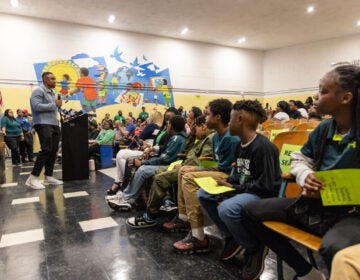School closings plan gets many thumbs down in North Philly
Nearly a thousand angry students and parents from North Philadelphia turned out for a community meeting Tuesday night to challenge the Philadelphia School District’s school closing plan, which would hit their neighborhood especially hard.
“How do you justify closing 12 schools in North Philadelphia?” asked Shamiah Simms, a sixth grader at T.M. Peirce Elementary.
Along with Peirce, Strawberry Mansion High and L.P. Hill, Whittier, Duckrey, Meade, Reynolds and Morris elementary schools would be shut down altogether under the proposal. Vaux High, Rhodes Middle, and Pratt Elementary would lose their academic programs, and the Philadelphia Military Academy at Elverson would move out of its building.
From elected officials to first graders, the crowd overwhelmingly denounced the plan.
“I have a real problem with it,” said City Council President Darrell Clarke, whose district covers much of North Philadelphia.
“I say we should fight back!” said 7-year old Sariyah Sparks, to raucous approval from the overflow audience inside the auditorium at Dobbins High.
Seeking savings and efficiency
Citywide, the district wants to close 37 school buildings and relocate or reconfigure dozens more. Since December, Superintendent William Hite has pressed the argument that dramatic action is necessary in order to save $28 million a year and focus the district’s attention on improving the remaining schools. In North Philadelphia, said the superintendent, the district has failed for years to adjust to declining student enrollment.
But at Tuesday’s forum, the first of nine, Hite and other officials struggled to make their case. Their attempt to begin the meeting with a formal presentation was drowned out by chants and jeers.
“Welcome to North Philly,” parent activist Dawn Hawkins told the superintendent.
Those in attendance questioned nearly everything about the district’s recommendations for their neighborhood, from how it would impact the academic offerings available to students to how students with severe disabilities would be affected.
Will kids be less safe?
Khayriyyah Murrary was one of dozens in the crowd who focused on student safety.
Under the plan, Murray’s son, a fifth grader, would be reassigned from Duckrey Elementary, a block from her house and around the corner from Temple University, to M.H. Stanton Elementary, several blocks away.
“Now, he walks by college students on his way to school. To get to Stanton, he’d be walking by drug dealers and dropouts,” said Murray.
And 15-year old Nacir Macklin-Collins was part of a large contingent from the Philadelphia Military Academy at Elverson. The district wants to relocate that school from its current location at 13th and Susquehanna to Germantown, prompting worries about transportation.
“My mom don’t have a car. My dad don’t have a car. How am I going to get home?” asked Macklin-Collins.
Others focused on the district’s proposal to close Strawberry Mansion High.
Frank Thorne, an alumnus of the school, angrily questioned Hite on why Mansion is being closed, rather than improved.
“I’m asking you, man to man, what you are you going to do to fix it?” said Thorne.
But Thorne’s own experience highlights the district’s dilemma.
Though Mansion would be his daughter’s neighborhood school, he sends her to Mastery-Simon Gratz, a former district high school now run by an outside charter operator. Thorne cited the school’s superior curriculum and communication with parents as motivations for his decision.
He’s not alone.
According to the district, 2,053 students live in Mansion’s geographic boundary, but only 332 of those children attend the school. Nearly 600 attend charters.
The result is that the school has room for over 1,700 students, but is 75 percent vacant.
“Right now we’re spending a lot of money on maintaining seats that are empty,” Hite said. “We would much rather have those monies go to offering students a better curriculum, more technology, more individuals that can help with safety, more music, more art, more opportunities for many of our students.”
Too many empty seats
In the short term, any savings from school closings would go towards helping plug the district’s budget deficit, which is $200 million and growing. Hite was adamant that the downsizing would allow the district to better compete over the long haul.
“We are trying to make our schools better so that when people are making choices about schools they’re choosing district schools,” he said.
“But we cannot do that if we’re carrying 53,000 empty seats.”
On this night in North Philadelphia, however, that message did not go over well.
Council President Clarke called some of the recommendations “flawed” and said he intends to sit down with Hite to “see if there is a willingness to make changes.”
Also unhappy were state Sen. Shirley Kitchen and state Rep. J.P. Miranda, who called the district’s plan “disrespectful” and “disgusting,” respectively.
Representatives from Action United, Youth United for Change, and the Philadelphia Coalition Advocating for Public Schools (PCAPS) also denounced the plan.
“We have a recommendation for you: a one-year moratorium on all school closings,” Ron Whitehorne, a PCAPS leader, told district staff.
The next community forum on the school closings plan is scheduled for Wednesday evening at 6 p.m. at Edison High School.
This story is part of a partnership in covering the Philadelphia schools between WHYY/NewsWorks and the Public School Notebook.
WHYY is your source for fact-based, in-depth journalism and information. As a nonprofit organization, we rely on financial support from readers like you. Please give today.




